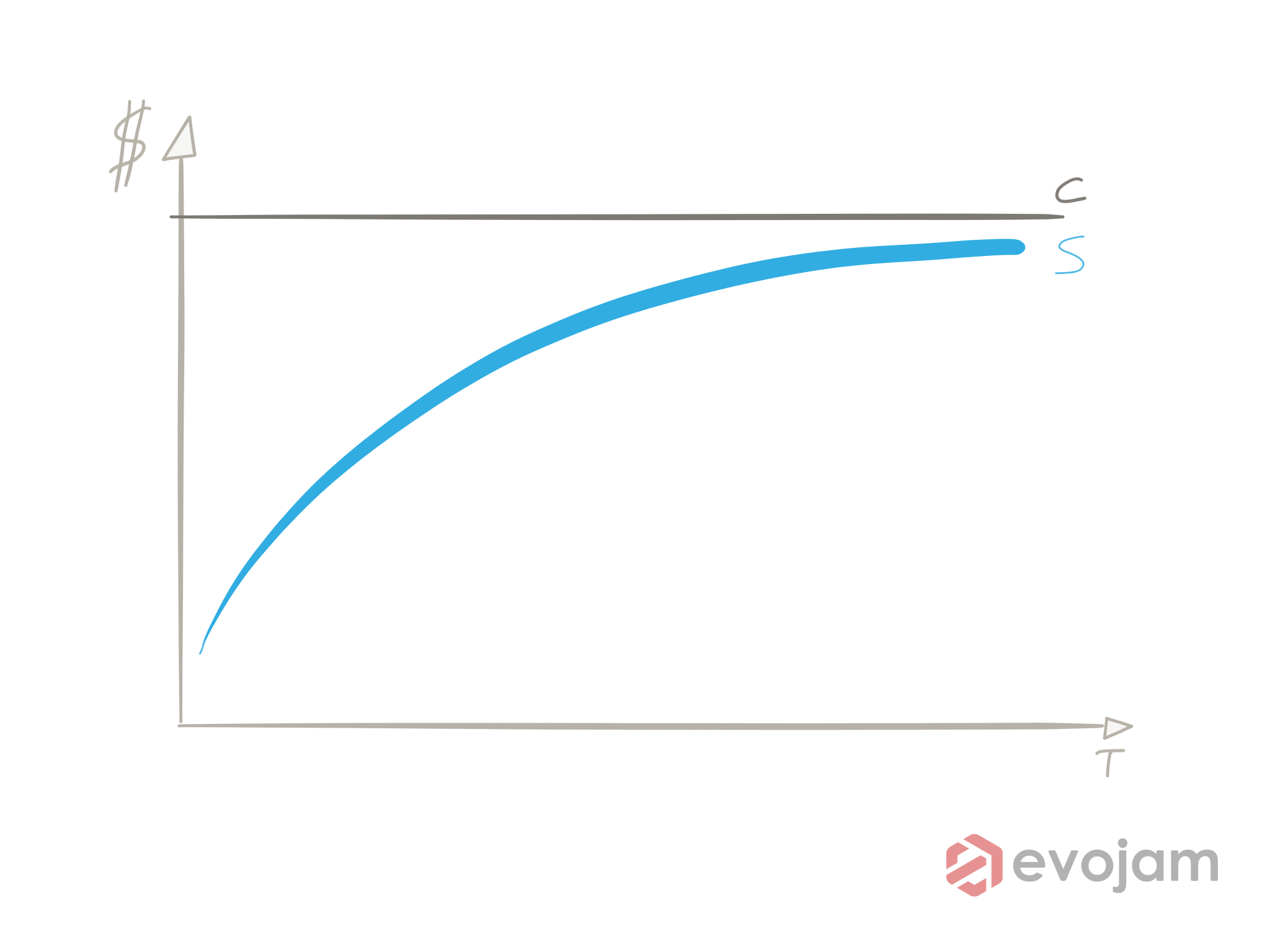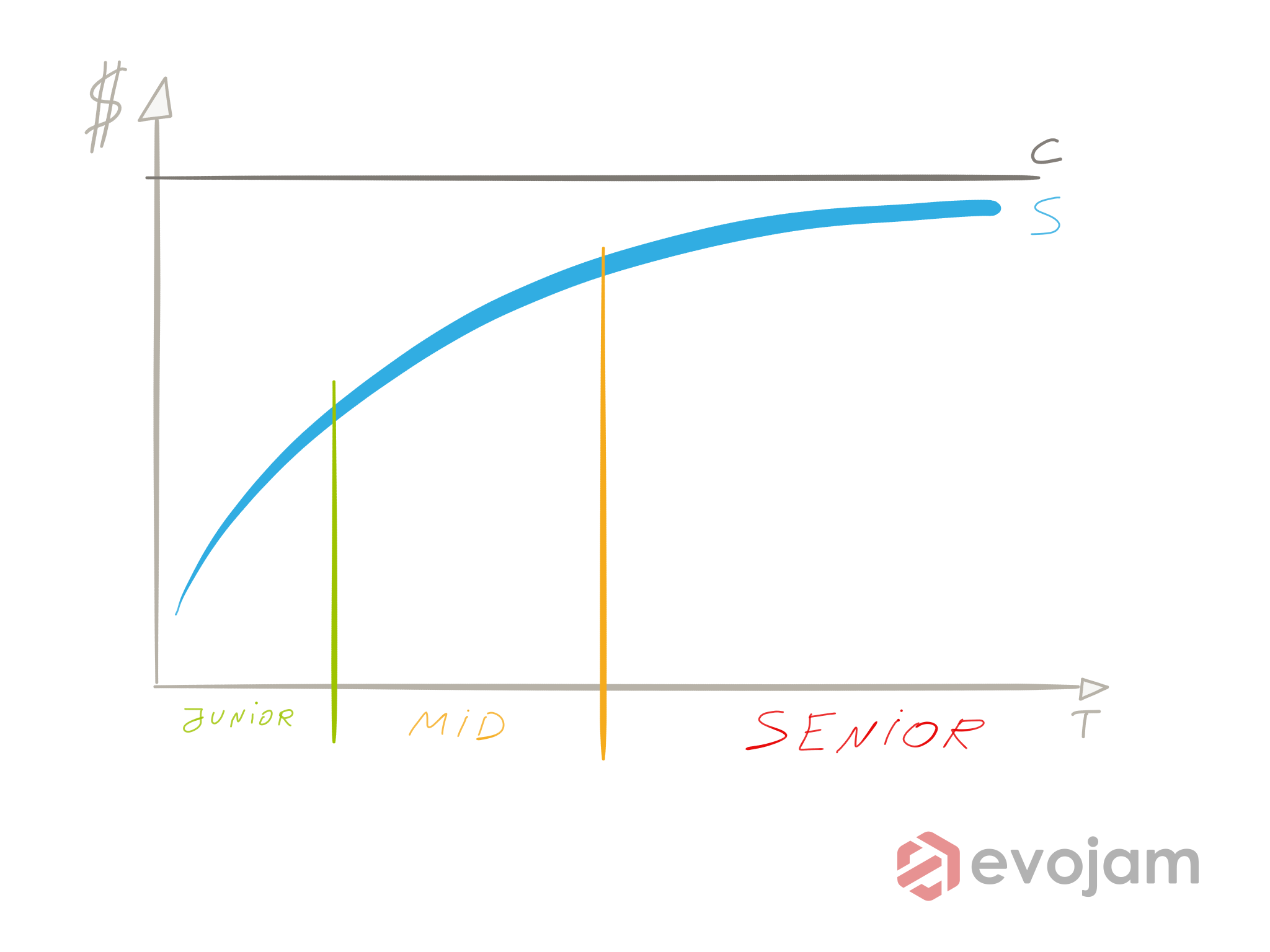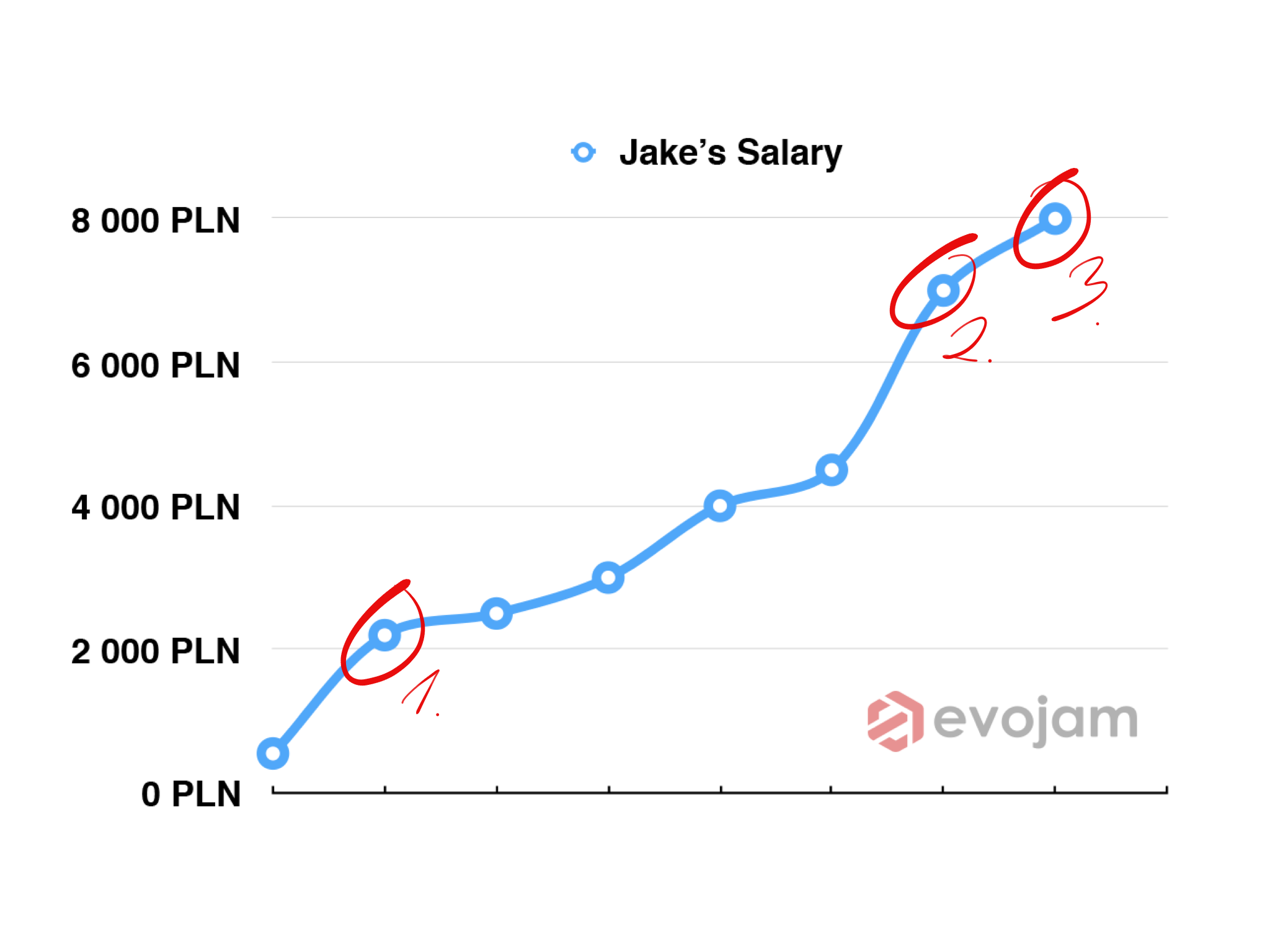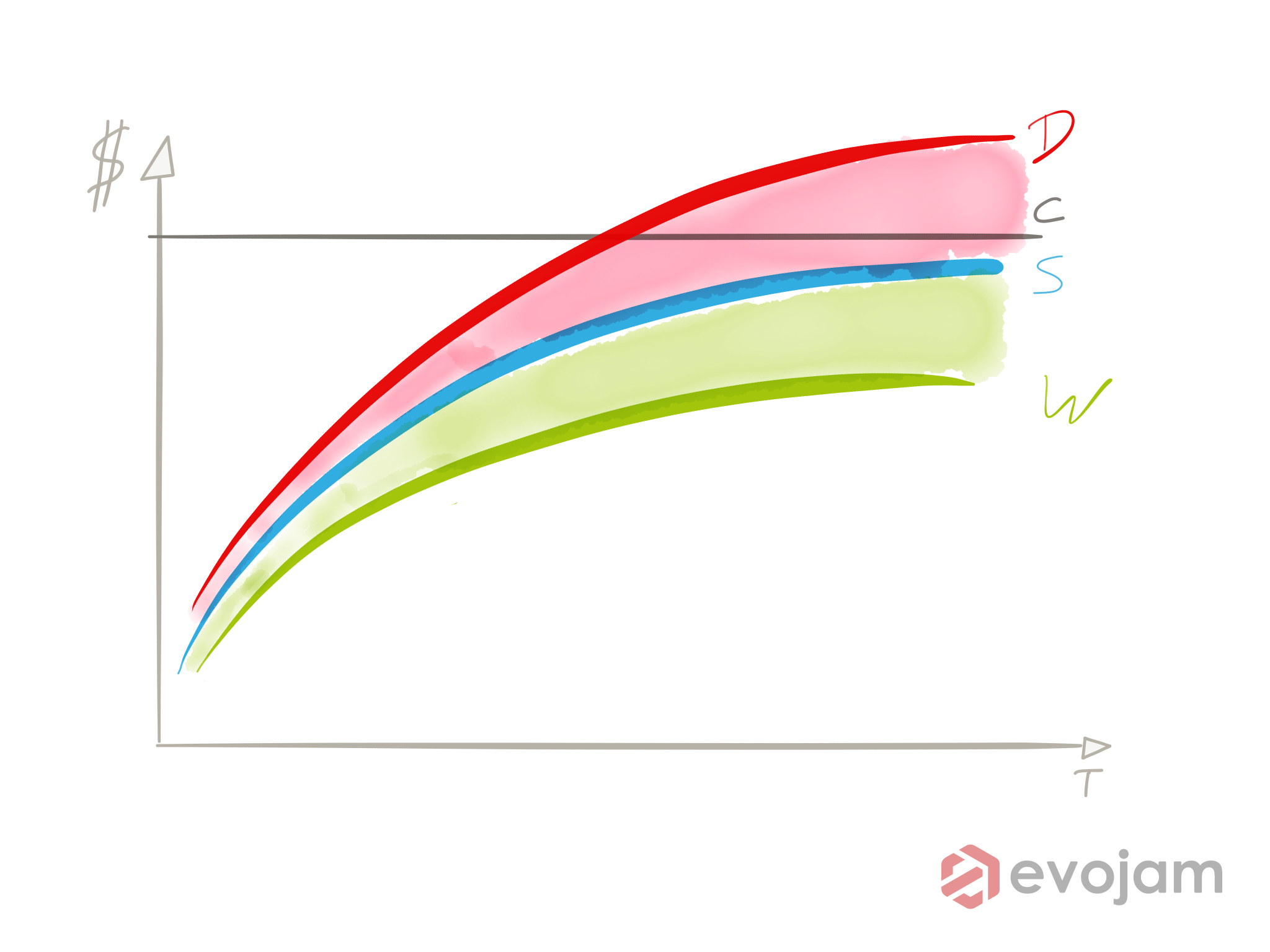Developer Salaries: 5 Threats & Opportunities Nobody Explained You Before
Here's how salary grows with years spent in the IT business. This chart is an obvious oversimplification. However if you average among many programmers, it will look like this. Have you thought how this impacts your work and life?

S curve is salary. I'll explain the C line later.
Everything in this post is combined experience from thousands of job applications, hundreds of interviews and dozens of recruitment processes I've conducted over the years. It also contains personal experience of Evojam crew and my own. It's a foundation of our approach to salaries.
There's various consequences of that salary curve: threats and opportunities.
1. Wild Ride At The Start - Opportunity For Juniors
In the first few years of your work as a developer your market value rises rapidly. Your salary should follow. Also in this period every employer has a hard time putting a concrete value on your work. You're a gamble for the company, an unknown. You have tons of learning ahead of you and real-world experience to gain.

This situation produces paradoxes. In the very beginning it's not clear whether you're good material for a developer. During this time period you may get job offers that differ by 2-3 times. When switching jobs you may get a 2x salary rise. This happens. Employees of similar experience may have wildly varying salaries.
A wise employer should account for that. Here's a real-life example of someone on the Evojam team. Let's call him Jake :) Jake joined our team as an intern without any professional experience and this is what happened until today:

Point 1. - Jake becomes a junior developer (part time)
Point 2. - Jake becomes a mid-level developer
Point 3. - We raised the salary grid, ie. salaries in the whole company. Jake gets an automatic raise
As you can see his salary has been raised 7 times and he didn't ask for any of those raises, he just got them! :). The rising salary reflected his meteoric rise: learning and gaining experience. It also takes into account inflation and market changes.
2. There Is A Ceiling - Reality Of Senior Devs
Do you remember the C line on the first picture? Here's the chart again so you don't have to scroll:

The C-line is a ceiling, an asymptote. Whether you like it or not there is a limit to how much you can earn as a mature developer. It depends on the technology you specialise in, your industry, geographical location and others. But it's there.
There's a couple of things you can do to push the salary above the ceiling. Each one comes at a tradeoff.
Move - You may want to move to one of the famous tech hubs: London, San Francisco. Tradeoffs: Living expenses, being away from family and friends. You may end up with a salary of $200.000 and co-renting an apartment with 3 other folks, because you can't afford anything better.
Become indispensable - This is a nice way of saying you need to hold somebody by their balls. It means becoming a key member of a large project that needs to succeed. Tradeoffs: lock-in or being stuck doing something you don't want, being needed 24/7, no ability to take vacation or find a replacement.
Unique expertise - This means becoming expert in something very narrow or combining 2 or 3 distant areas of expertise that someone finds extremely valuable. Tradeoffs: you lock yourself in something that may become boring. It may be very hard to change jobs or industries as you may not be able to find another company that values this specific expertise. In other words if the niche is so lucrative it's probably extremely narrow as well.
Other - there are obviously other ways of breaking through that ceiling, but they usually mean breaking up with coding: become a tech executive, a successful entrepreneur, etc. Tradeoffs: Moving away from technology. Handling politics and people. Going through rough periods of low to no salary.
The salary ceiling is also pushed up by: inflation, competition and state of economy. But those are things you can't do anything about on the individual level.
More on the tradeoffs below in the point 4. Dream Salary Trap.
3. Expenses Trap - Threat for Mid-Level Devs
There is a trap waiting for you in the first few years of work. Quickly raising salary wakes up your desires. All the things you couldn't afford through the years of school now come competing for your wallet. If you indulge yourself too much you may end up spending a lot. That's what I've done.
Take a look at this chart.

D curve stands for dumb spending. The space between D and S is usually financed with credit cards, car loans and other forms of debt.
When you become senior, your salary growth slows down. What if you've been following the D line? You become a slave to your debt. It starts to dictate your course of action, your decisions, your life choices. It may push you to take jobs you don't want to do. It may make you specialise in a legacy technology nobody want's to work with anymore, so it pays better. It may mean lowering your living standards to repay the loans. It may force you to move countries in search of a higher salary. It may mean debt spiral or even depression. That's the price for being dumb. Trust me, I'm speaking from experience. Sounds scary?
W curve stands for wise spending. The space between S and W means you have savings. This means you can afford vacation, you're in liberty to move where you want. It gives you flexibility to change jobs when you feel like it. It means freedom from debt. It means possibility to launch your startup, to retire early, etc. This is options and freedom.
Rule of thumb to avoid falling into debt is this: if you can't buy something with cash, you can't afford it! That's it. One exception is a mortgage perhaps, if done wisely but that's a separate topic. Key thing to remember is that salary and expenses are always related. Why not make it work for you, not against you?
4. Dream Salary Trap (or Who Pays The Best)
We all want to earn more. It's never enough. It's natural. That's our instinct, it's our desires, greed and fear. Given the key insight from the previous point, that our spending is always in some relation to our salary, this creates a trap. A trap we enter unconsciously, feeling good about it actually. We take the highest paying job.
But have you thought who's paying best? What are those shiny jobs that pay more than the market average? First let's rule out the exceptions in the form of the Googles and Facebooks. Then let's exclude the locations with extreme competition: Silicon Valley, New York, London and few others. Outside of that - which is where most of us live - the best paying jobs are the crappiest ones. Ones nobody wants to do, where high salary is a form of a bribe. Legacy systems, tons of spaghetti code, incompetent management. Projects boring as hell. Working for the highest bidder can make you do things you don't want to do.
Again I'm talking from my experience here. I once had an excellent paying job with an outsourcing company. Over the course of 1,5 years I learned nothing. This time disappeared in /dev/null. I was an expensive cog in a machine. Actually it was worse. Having high salary in that period enabled me to get myself into debt corresponding to that high salary. Imagine yourself in such situation. How can you move from such a place to something interesting that pays less?
On top of that the IT salaries tend to be the highest on the market. What if you discover one day you want to be a yoga instructor or a photographer?
5. Make Learning & Fun the Compass
Is salary a bad indicator of a great job? Well, it depends on your personal values and priorities. You may be one of those rare persons that can do anything as long as the pay is great. In this case it can be a good indicator. In my experience however, most people want something more from their job. They want some kind of fulfilment or satisfaction other than money.
Definitely in the first few years of the career learning is the most important aspect. Even if learning is not your core value, you'll end up in a much better place in the long run. Your work satisfaction and negotiating power will be vastly dependent on the amount, speed and direction of learning done in the young years.
I've been recruiting IT folks for over a decade now. Believe me, I'm sad holding a resume of someone who's spent first years of his work in a crappy environment. He or she has put in time to learn bad practices, technologies nobody works with and build poor habits. And now, having the burden of mortgage and other obligations of life they need to do both: start learning again and keep a high salary. That's a difficult position to be in.
You may also follow your interests and passions instead of high salary. Do something fun. Coming out of college your expenses are pretty low anyway, so you may settle for an average salary and do something fun thanks to that. This will boost your trajectory in two ways. First, it'll keep you from falling into debt too much, even without strong self-discipline. Just because you don't earn a top salary. Second, it'll make you great at what you do. You can't be great in the long run doing something you hate. So following your interests will pay out eventually. You can always switch to the highest bidder when you need to.
Bonus: How To Build Savings?
Update: A few weeks after posting this I realized that I didn't put down the most important hack in here. At least explicitly. So here it is. Whenever you find your self in a situation when you salary grows (especially significantly), keep your spending on the same level!
Yes it's hard. Yes, there's plenty of desires and wants and lifestyle options you will want to fulfil. Don't! Here's the trick: this is the easiest way to come into possession of a nice sum of money. Much easier than starting a business or trying to lower your spending later. Trust me. Keep the burn rate down. Yeah, reward yourself, go for vacation… but do it once. This will build your savings. This will give you freedom.
How We Handle Salaries At Evojam
There are certain consequences of the salary curve we take into account at our company. Here's some of them:
We give a raise when it's due. We raise salaries often. We review quarterly. The more junior an employee the more often we raise their salary. We don't wait until an employee asks for it.
We ignore how much people want to earn. During the job interview there's always the unavoidable question: how much would you like to earn? We ask it as well. But here's a twist: we ignore the answer. We only ask it to know the expectations of the candidate and if there's a chance we'll meet. After the careful recruitment process we asses the skills and potential of the candidate. We run this through our Levels and Salaries grid and come up with a proposal. In truth we care deeply about how much people earn but we think about it on the team level.
The team has consistent salaries. We don't have situations where a newcomer to Evojam earns more than someone who's been with us for a long time or someone more junior. Everyone knows where they stand and what's ahead of them. Salaries are not public, but they're always justified.
We put a great deal of effort into building a straightforward, fair and consistent way of renumerating employees.
I hope this article clarifies the salary aspect of our great profession. I know the topic is controversial and opaque in many companies. I hope this post sheds some light and enables you to have some honest discussions with your friends, co-workers or even your boss.
It this approach appeals to you be sure to checkout our job offers on the frontend or backend:
Keep an eye for new posts from us on: